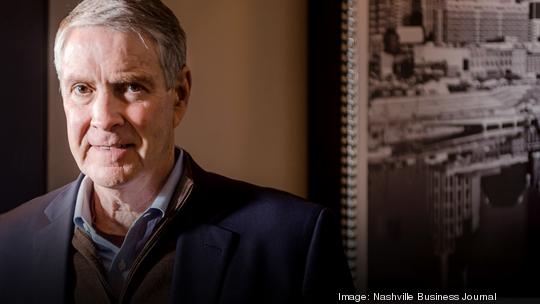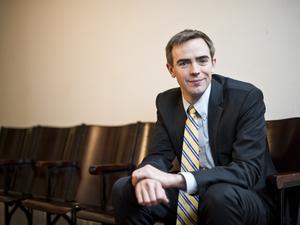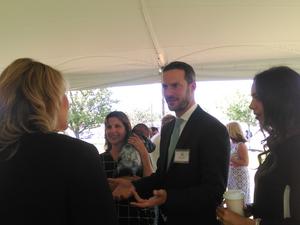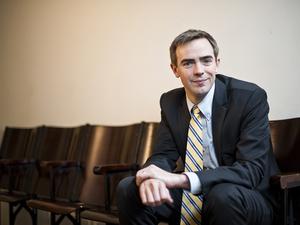
Returning home from his stint in Washington D.C. as part of the Trump Administration, Aspire Health co-founder and former CEO Brad Smith was ready for something new.
“Aspire, I kind of tripped on, honestly. My brother was trained to become a palliative care physician and I’d never done health care before. It got me interested,” Smith said. “What was kind of different this time was after leaving the government being able to step back and say, ‘What am I really passionate about, and where do I think there’s a big problem that we can help improve?’ That’s what got me excited about rural [health care.]”
That excitement led Smith to create Main Street Health — a health tech firm focused on providing value-based care in rural America.
Smith launched the company earlier this week out of Russell Street Ventures — a part private equity firm, part incubator focused on creating and growing health care startups — with the help of a $26.4 million investment from Smith, Frist-Cressey Ventures and Oak HC/FT.
Main Street is a sort of reunion for Smith and Frist-Cressey founder and former U.S. Senate Majority Leader Dr. Bill Frist. The pair founded Nashville-based palliative care company Aspire Health in 2013, selling it to health insurance giant Anthem Inc. five years later.

They also share a passion for rural health care, with Frist becoming aware of its challenges as a heart transplant surgeon at Vanderbilt University Medical Center, where the vast majority of his patients were from rural areas.
Health care in Tennessee’s rural counties is under threat, with 13 rural hospital closures since 2010, according to the Tennessee Hospital Association, the second most in the nation. Frist said another 23 rural hospitals in the state are at risk of immediately closing.
What makes Main Street unique, Frist said, is that it will be the first health care company to partner with rural primary doctors, urgent care clinics and independent pharmacies, while focusing exclusively on value-based care, which is a form of reimbursement that’s based on the quality and efficiency of care.
That’s why Main Street’s initial program, called Extra Access, will center on Medicare senior patients, Smith said — they typically have higher health care costs, leaving more opportunity to find savings and improve care.
Main Street has a proprietary care management platform that integrates with a doctor’s electronic medical record to coordinate care, and patients will have 24/7 access to a doctor-led care team that will work with their primary physician.
Seniors will also be helped by Main Street’s local “health navigators,” who will work inside the startup’s partner clinics and pharmacies to help coordinate patients' care.
“The reception we’ve gotten from the doctors has really been fantastic,” Smith, who is the company's CEO, said. “For many of these folks a big office may be one to two doctors, two or three nurse practitioners and maybe three or four other staff. When you add a person and go from five people to six people … it’s a real add to the office, whereas in an urban area with 40 or 50 people in an office, one more person is kind of like a rounding error.”
Those local health care navigators, Main Street’s relationships with local doctors and pharmacies and its value-based care model will be the keys to the company’s success in rural America, Frist said.
“Most of the big payors and insurance companies basically said, ‘We have not been successful in rural communities,’ and therefore they focus on higher dollar, urban areas. They said, ‘We don’t know how [to operate in rural areas.]’” Frist, who is on the company's board of directors, said. “What’s unique about rural … is the more relational approach to health care, which means you need navigators in the field. If you couple those navigators — the relational, trusted part — with remote, seamless access to specialist, you’ll be successful if you add a dependable funding source. So, we’ll succeed where others have fallen short by focusing on value-based care and by integrating culturally sensitive empowerment of local nurses and doctors and independent pharmacies.”
For the next six to 12 months, the program will be offered at more than 30 locations across West Tennessee, in counties with a total Medicare patient population of more than 59,000.
Smith said the goal is to expand rapidly after that period, moving into two or three more states as early as next spring. He said the company is currently looking at areas in all 50 states for where to grow next.
Main Street also plans to expand from Medicare into Medicare and commercial insurance patients as well, Smith said, but that is likely two to three years away.
“Seeing all these risk-based business models pop up primarily in urban and suburban areas … we feel like there is an opportunity to tweak those models and figure out how to adapt them to operate in rural America,” Smith said. “We’ve spent the last five or six months in rural Tennessee meeting with doctors, hospitals and pharmacists. … The physicians in rural America are incredible. … But what you also hear is this desire to be able to do more for their patients and this model allows that.”








